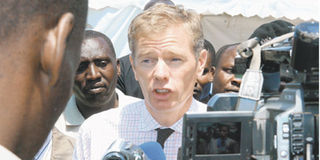Britain: Give us back our money

British High Commissioner Rob Macaire fields questions during a visit to Africa Sports and Talents Empowerment Programme offices in Eldoret when he said the British Government would like to see decisive steps taken before it could resume supporting Free Primary Education.
Britain is demanding a refund of Sh7 billion aid to Kenya’s free education programme following revelations of massive corruption.
“The UK Government will push the Government of Kenya hard for return of the UK’s share of lost funds,” the Department for International Development (DFID) said in a statement.
During an interview in Nairobi, DFID deputy head Mike Harrison said the money once repaid will be ploughed back to fund education in Kenya but through non-State channels.
“We are insisting that besides the government instituting radical reforms in the Ministry of Education, our proportion of the pool fund must be returned,” Mr Harrison said.
The DFID last year hired an independent consultant who worked with Ministry of Finance to audit the Kenya Education Sector Support Programme (KESSP).
The audit was completed last December, but the findings revealed only on Monday this week by Finance minister Uhuru Kenyatta, accompanied by Education minister Sam Ongeri.
The report showed that Sh4.6 billion could not be accounted for as ministry of Education officials involved themselves in brazen embezzlement of the funds.
Mr Kenyatta’s statement provoked a flurry of accusations and counter-accusations, with Kenya Anti-Corruption Commission boss P.L.O. Lumumba accusing the Finance minister of putting on a show to impress some visiting World Bank officials.
Prof Lumumba denied suggestions by Mr Kenyatta that the anti-graft agency had been lax, and called on Prof Ongeri to take responsibility for the fraud.
Finger of blame
In Parliament, Prime Minister Raila Odinga also pointed the finger of blame at Prof Ongeri.
Medical Services minister Peter Anyang’ Nyong’o whose docket had also been accused of corruption by Mr Kenyatta was also harshly critical of the Finance minister whom he accused of distorting facts.
In Parliament yesterday, Prof Ongeri was pressed hard on the Sh4.2 billion lost in the scheme. Temporary deputy speaker Ekwe Ethuro asked the minister to get his figures right.
The British announcement came as President Kibaki warned public servants that those who misappropriate public funds will be punished.
“The concept of performance contracting encompasses the core precept of accountability which, as your President, I wish to bequeath the country and leave as a legacy for posterity,” President Kibaki said.
Education Permanent Secretary James ole Kiyiapi, who also distanced himself from corruption in the ministry following Mr Kenyatta’s report, on Thursday said that the free education programme would not be affected by the British funding cutback.
“The government is currently funding the entire programme almost 100 per cent,” said Prof Kiyiapi.
Support for the programme is currently from Unicef and the African Development Bank.
But he admitted that only the Treasury could determine what each donor gave during the period in question.
Part of key donors
The UK is a part of key donors including America, Canada, Sweden, the World Bank and Japan who massively fund educational programmes in Kenya.
Mr Harrison on Tuesday this week said that his department had also slashed the amount that it allocated to education for Kenya this year by Sh300 million due to corruption in the ministry of Education.
But even as the President was sounding the warning, another scandal, involving misuse of Sh360 million under a project to aid pastoral communities came to light.
A forensic audit by the World Bank led to the suspension of the Arid Lands Natural Resources Management project in July last year.
The audit covered expenditures in seven districts over 2006-2007 and 2007-2008 financial years and found suspected fraudulent expenditures in up to 29 per cent of those sampled, totalling more than $4 million.




